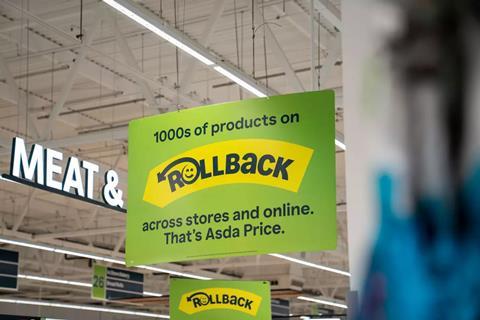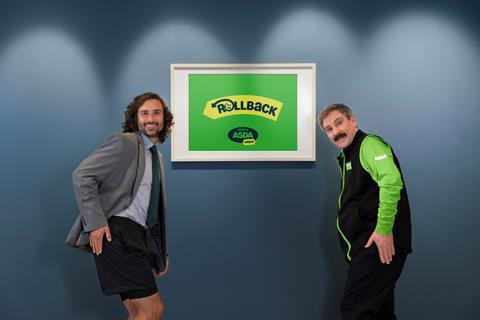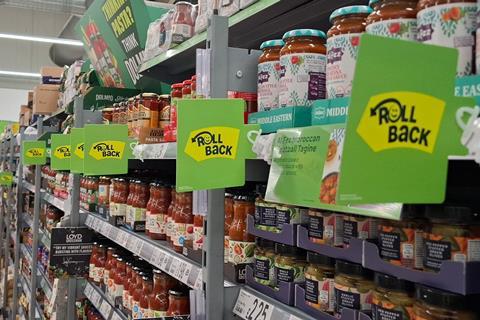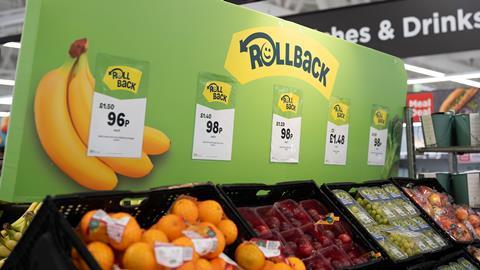The return of Asda’s Rollbacks wiped over £4bn off the value of Tesco, Sainsbury’s and M&S. But is it rowing back on its Rollback programme?
’That’s Asda price’ is how the marketing slogan goes. But ‘what’s Asda price?’ is the question raised by exclusive data published by The Grocer this week.
The supermarket relaunched its “iconic” Rollback promotions with bold claims on 30 January as executive chairman Allan Leighton promised to “make Asda the cheapest traditional supermarket”. It spooked the markets, wiping more than £4bn from the value of Tesco, Sainsbury’s and M&S in the weeks that followed.
But the data shows Asda’s fighting talk is at best inconclusive, and at worst, misleading.
While vowing to move away from “three- to four-week promo cycles”, according to an Asda investor programme, “to a 12-week Rollback to a permanently lower Asda Price, the data shows the majority of Rollback prices have lasted four weeks or fewer.
And while Asda boasted in March of “nearly 10,000 products” reduced in price due to Rollbacks since January, the number of Rollback products at any one time actually fell over the period from 4,000 to 3,370, as the supermarket added 10,310 products but removed 6,940 (see table).

Asda insists the Rollback programme is a rolling one. And in a letter responding to The Grocer’s report, Allan Leighton reiterated that promotion cycles would be “up to 12 weeks”.
But there’s also a question mark over the new ‘Asda Price’ plans. Fears of a price war were fuelled by Asda billing Rollback as a route to moving its entire range to the “permanently lower Asda Price”.
So products would come out of Rollback at a new, lower ‘Asda Price’, rather than go back up, it vowed. In this way, it would build a price gap against rivals, with its entire range going through Rollback by the end of 2026, it said. And the new, permanently lower Asda Price would follow as a result across a range that would also be reduced by 6,000 SKUs to help enable it.
But so far at least, the data shows lots of products are going back up to the same price – or higher. Of the 6,940 products removed from Rollback by 2 April, 1,765 SKUs – just over 25% – moved back to their pre-Rollback price, while another 628 (9%) were higher than pre-Rollback.
Asda Price
Asda points out this means 4,550 products have moved to a lower than pre-promotional price. But while the total number of Asda Price lines grew throughout the period, 480 were removed by the end. And despite more than 6,000 individual products going through Rollback, the table shows fewer than 1,200 had made it to the ‘Asda Price’.
That some products have come out of Rollback at a higher than pre-Rollback price is something Asda has vowed to look at, but the process of rolling back to a new, lower Asda Price is nevertheless underway, it argues. In the letter, Leighton insisted “we aren’t looking for a quick fix; it will take time”.
So: a work in progress then? Clive Black, the Shore Capital broker thinks Asda isn’t being straight with its shoppers.
“With few, if any, dates on the shelf-edge labels, we have been uncertain how long promotions run for and so what is the original date of commencement and any price reduction. And when a product comes off promotion, what is the basis to understand if it is a new permanent everyday low price or otherwise?”
And Black argues that trading standards or other regulatory bodies “might [even] be musing” an investigation.

What does the law say?
But the law is surprisingly vague on the question of promotions. Ged Futter, director at The Retail Mind, says: “The issue is there is no law. There is only the Chartered Trading Standards Institute Guide to Pricing Practices 2016. It puts the responsibility at the door of the retailer ‘to be fair and not misleading’, but makes clear it comes down to ‘best practice’.”
He’s not wrong. The CTSI document stresses it is “not statutory guidance” though “regulators may refer” to it.
On promotions, it suggests retailers should ask themselves three questions: “Is any information (however it is given) false? Even if the information is factually correct, will it, or the way in which it is presented, deceive or be likely to deceive? Is information that a consumer needs to know omitted, hidden, or given in a manner that is unclear, unintelligible, ambiguous or untimely?

“If any of your answers are ‘yes’, or if you have any doubts, you should change your promotion,” the guidelines add.
But while the retailer needs to ensure that any pricing promotion that uses a previous price for reference is a fair comparison and especially that the reference price was the usual selling price,” says Tom Smith, competition and consumer lawyer at Geradin Partners and former CMA director, “there is no strict legal requirement to publish the duration of the offer”.
Futter, who was an Asda buyer and senior buying manager from 2003 until 2015, agrees. “They haven’t said anywhere that ‘all Rollbacks are guaranteed for 12 weeks’.
Other retailers also set over-arching terms for campaigns and then flex the duration of individual promotions within them, he adds.
“Each retailer will look at the guidance and pricing mechanics and promotions in their own way, and they will look at how they can stretch whatever they are saying.”
Read more:
-
Asda cheapest in Grocer 33 as guest M&S/Ocado trails regular pack
-
Asda sent thousands of complaints over ‘Orwellian’ facial recognition trial
-
Rollback or rowback? Asda pulls plug early on thousands of Rollback promotions
-
Asda tech team shake-up sees CIO and tech VP depart
And while “moving to up to 12 weeks” may have been Asda’s statement of intent, getting suppliers there would take time, added Futter.
Twelve-week Rollbacks are “old-school Asda and something most buyers didn’t even like because each time you do it you’re getting less impact”.
“Do suppliers want all their products to go down in price for 12 weeks? No, because the industry is based on three or four-week cycles,” says Futter.
“There will be key lines where suppliers say ‘I’m not funding it for 12 weeks’. Suppliers will come round if they see volume coming through, so the bigger problem for Asda is that volume materialising.




















1 Readers' comment